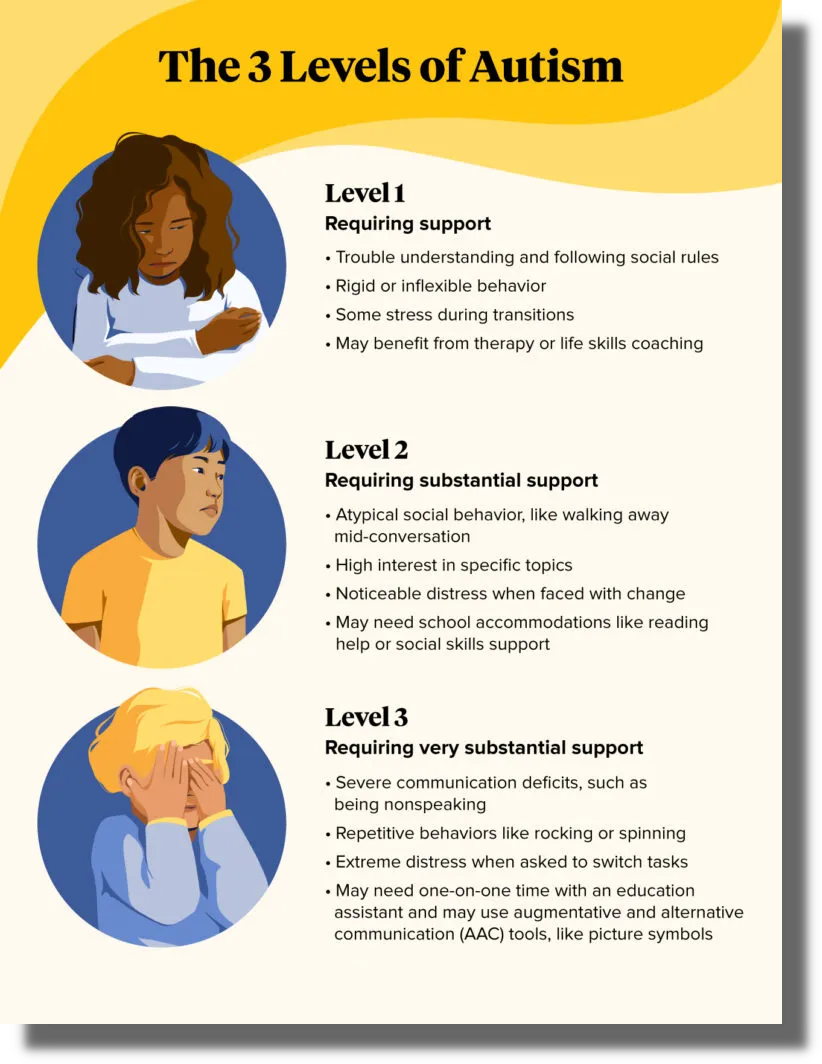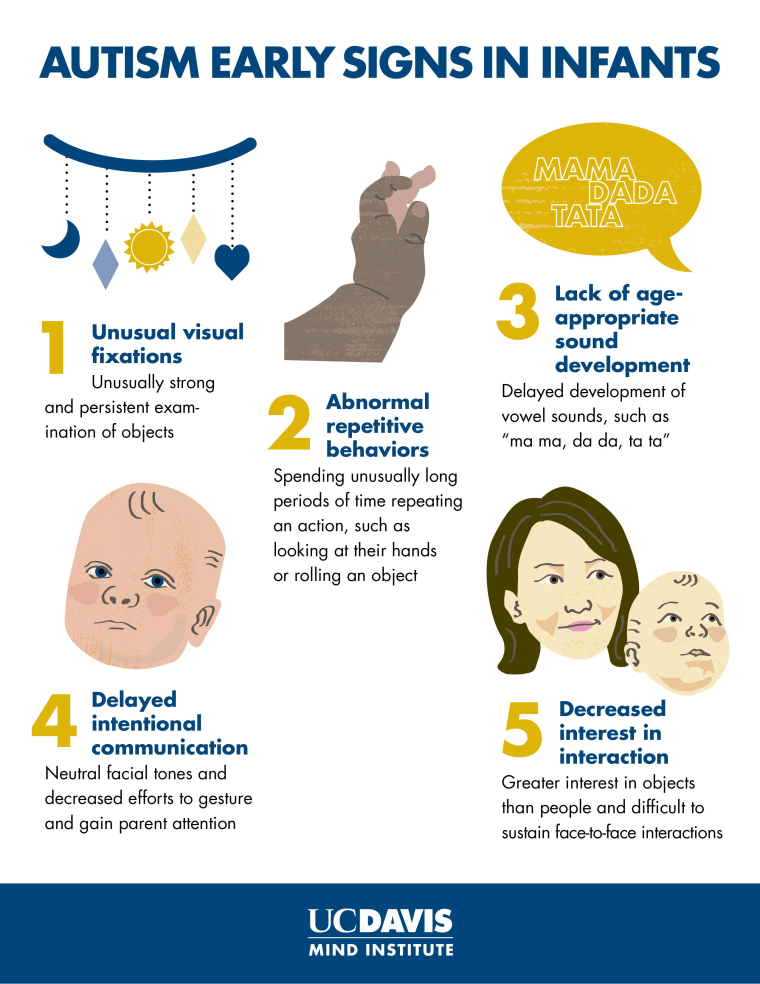Key Indicators and Signs to Identify in Individuals With Behavior Autism
When you run into somebody with behavior autism, identifying key symptoms and signs is essential. You could discover challenges in social interactions and communication, in addition to a strong requirement for routines. Furthermore, sensory sensitivities can lead to overwhelming experiences. Recognizing these attributes can boost your assistance and interventions, but there's more to reveal concerning exactly how these behaviors manifest in day-to-day circumstances. Let's explore what these indicators actually resemble.
Difficulties in Social Interactions
When you communicate with somebody on the autism range, you may see they battle with social hints and communication. These obstacles can make social communications feel frustrating for them.
Additionally, you might find that they like regimens and familiar settings, which can restrict their determination to involve in brand-new social situations. When they do involve, they might speak about their interests in great information without noticing if you're interested. This can bring about one-sided discussions that leave you feeling separated. Comprehending these challenges can aid you come close to interactions with compassion and persistence, fostering a more comfortable atmosphere for both of you.
Difficulty With Verbal and Non-Verbal Interaction

Non-verbal interaction can be a lot more challenging. You might see a lack of eye contact or limited use gestures, which can make interactions really feel uncomfortable. Faces might not always straighten with the conversation, resulting in confusion regarding their feelings. Identifying these indications is important, as it helps you much better support and involve with individuals on the autism range. By recognizing their communication challenges, you can foster much more significant links and give a much more supportive setting.
Repeated Actions and Regimens
Interaction difficulties typically come with other signs of autism, such as repetitive habits and a solid choice for regimens. You might observe that people with autism often participate in particular, repeated actions, like hand-flapping, rocking, or repeating expressions. These habits can give convenience and a sense of control in an usually overwhelming world.
Routines are similarly essential; several individuals thrive when they follow an organized schedule. You may discover that changes to these routines can result in considerable distress. For instance, if they have an everyday ritual of eating breakfast at a details time or adhering to a certain path to college, any disturbance can cause anxiousness.
Recognizing these patterns assists you understand their habits and offer assistance. By accommodating their demand for routine and enabling recurring actions, you can develop a more comfy atmosphere that reduces their difficulties.
Sensory Sensitivities

Usual Sensory Triggers
Sensory sensitivities can considerably impact day-to-day live for people with autism, as specific stimulations typically trigger frustrating responses. Common sensory triggers consist of loud noises, brilliant lights, and solid scents. You might observe that abrupt sounds, like alarms or alarm systems, trigger anxiousness or distress. Likewise, fluorescent lights in stores can feel extreme and awkward. Appearances can also play a considerable function; harsh textiles or particular food textures may be intolerable for you. Furthermore, crowded locations can overwhelm your senses, making it difficult to concentrate or relax. Recognizing these triggers can aid you manage your setting better. By being mindful of what impacts you, you can take actions to decrease pain and boost your daily experiences.
Behavior Actions Clarified
Recognizing your behavior actions to sensory level of sensitivities is necessary, as they commonly expose exactly how you engage with the globe. You may observe that particular audios, lights, or appearances bewilder you, bring about anxiousness or pain. When encountered with these stimulations, you may take out, cover your ears, or perhaps react strongly. These feedbacks aren't just peculiarities; they're your method of handling overstimulation. You may likewise discover yourself seeking certain sensory experiences, like deep pressure or peaceful atmospheres, to aid ground yourself. Acknowledging these patterns aids you understand your requirements far better and can lead exactly how you connect them to others. By recognizing your like it sensory sensitivities, you can work towards creating an atmosphere that feels a lot more manageable and comfy for you.
Coping Methods Review
Recognizing your sensory level of sensitivities is just the very first action; currently it's time to discover coping approaches that can assist you manage those experiences efficiently. Start by developing a sensory toolkit customized to your needs. Developing an organized routine can also offer predictability, reducing stress and anxiety around sensory overload.
Limited Passions and Focus
While lots of individuals develop a wide variety of rate of interests, those with autism commonly show limited passions and an intense emphasis on particular topics. You might notice that someone with autism can spend hours diving right into their favorite subject, whether it's a certain sort of train, a specific movie, or a scientific concept. This intense emphasis isn't just a hobby; it can come to be a main part of their identification and social interactions.
You might find that conversations revolve around these rate of interests, and they may have a hard time to involve in wider subjects. For them, these focused interests supply comfort and a sense of proficiency. While it is essential to encourage expedition of brand-new subjects, respecting their passions is just as crucial. By comprehending and recognizing these restricted passions, you can browse around this web-site promote an encouraging atmosphere where they really feel valued and comprehended, allowing for even more meaningful links and interactions.
Psychological Policy Troubles
Individuals with autism often encounter challenges in psychological policy, which can be affected by their extreme concentrate on certain interests. You might see that when an individual is deeply engaged in a recommended activity, they can experience strong emotions, whether exhilaration or frustration. When things do not go as prepared., this intensity occasionally makes it tough for them to move gears or handle their feelings - Aba Therapist Near Me.

Variability in Developing Milestones
When it comes to developing landmarks, you'll notice that individuals with autism frequently reveal a large array of irregularity. You may see a youngster succeed in language abilities yet battle with social communications.
It's vital to recognize that each person's trip is unique. Some might create intricate abilities early, only to face challenges later on. Others may take longer to accomplish basic milestones but after that grow in details locations. Observing these patterns can aid you recognize their toughness and requires much better.
Often Asked Concerns
How Is Autism Identified in Kid and Adults?
To identify autism in grownups and youngsters, experts examine actions, interaction abilities, and social communications. They often make use of standard tests, interviews, and monitorings to determine if an individual meets the requirements for autism range condition.
Exist Different Sorts Of Autism Spectrum Disorders?
Yes, there are various types of autism spectrum problems, including Asperger's disorder and pervasive developmental disorder-not or else specified. Each kind varies in intensity and qualities, so recognizing these distinctions can aid you much better assistance individuals with autism.
What Therapies Work for Individuals With Autism?
When thinking about reliable therapies for people with autism, you'll find alternatives like Applied Behavior Evaluation, speech therapy, and work-related therapy. Each method can help enhance interaction, social skills, and everyday operating customized to individual requirements.
Can People With Autism Lead Independent Lives?
Yes, individuals with autism can lead independent lives. With the best assistance, abilities training, and sources, you can help them establish self-sufficiency, handle day-to-day jobs, and thrive in various settings, fostering their independence.
Exactly How Can Family Members Assistance Loved Ones With Autism?
You can support your liked ones with autism by producing an organized atmosphere, motivating their rate of interests, practicing patience, fostering communication, and advertising social skills. Celebrate their success, no issue just how tiny, and construct an encouraging area.
Although several view it now people on the autism range can recognize and make use of language, they frequently face significant challenges with both non-verbal and spoken interaction. Identifying these indicators is crucial, as it aids you far better assistance and engage with individuals on the autism range. You could observe that people with autism commonly engage in particular, repeated activities, like hand-flapping, shaking, or repeating phrases.Sensory sensitivities can significantly affect daily life for individuals with autism, as certain stimuli commonly cause frustrating reactions.When it comes to developing turning points, you'll observe that people with autism commonly reveal a large array of irregularity.